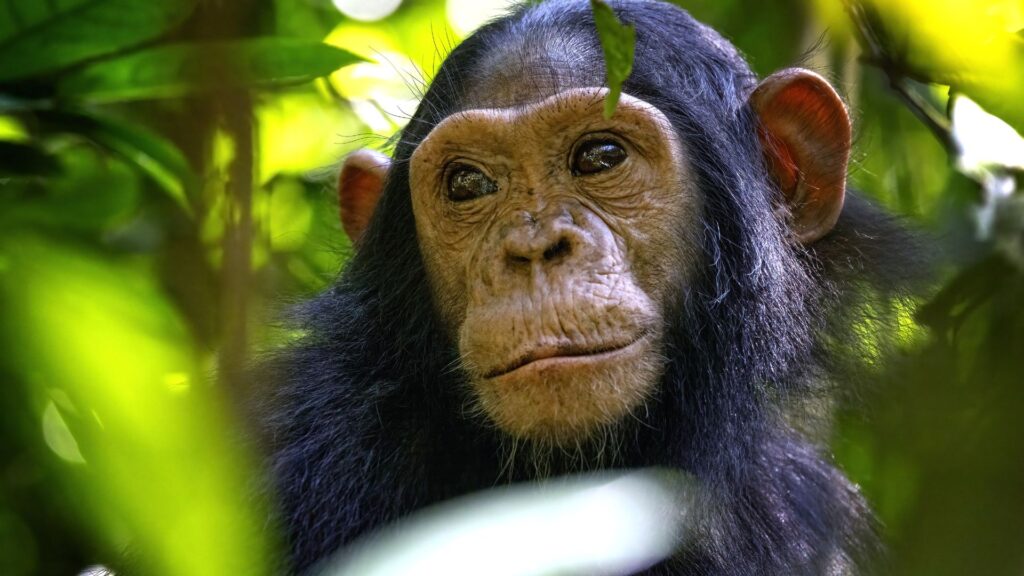Do, Chimps Really Attack Face And Hands? Yes, chimps can attack the face and hands. The reason behind this because they are very dangerous areas to confront a chimp. Chimps are highly protective of the face and hands and they’ll attack anything and everything.
Chimps can also attack the face and hands to show dominance. As these parts are very exposed, it is easy for them to attack directly. Additionally, chimps can also attack when they are unfamiliar to you.
Chimpanzees are often considered to be the closest relatives of humans, and as such, they share many of the same behaviors and traits. One behavior that is often observed in wild chimpanzees is their tendency to attack the face and hands of other chimpanzees or humans.
But why is this? This article will examine the reasons why chimps attack other individuals’ faces and hands, as well as possible solutions for this behavior. We will also explore how human-chimpanzee relationships can be improved by understanding these attacks better, and how to protect ourselves from potential threats.

Contents
Chimpanzee aggression and facial expressions
When it comes to aggression, chimpanzees are well known for their use of facial expressions. A recent study published in the journal Animal Behaviour looked at the frequency and types of facial expressions used by chimpanzees during aggressive encounters.
The study found that chimpanzees use a variety of different facial expressions when engaging in aggression. The most common expression used is an open-mouth display, which is often accompanied by a threatening gaze. Other common expressions include bared teeth, lip smacking, and head shaking.
While the specific meaning of each expression may vary depending on the context, the overall message conveyed by these facial displays is clear: do not mess with me or I will hurt you. So next time you see a chimp making an aggressive face, it might be best to give them some space!
Why do chimps attack the face and hands specifically?
When chimpanzees attack humans, they often target the face and hands. There are several possible explanations for this behavior.
- One theory is that the face and hands are more exposed than other parts of the body, making them easier to reach.
- Another theory is that they see these body parts as being particularly vulnerable, so attacking them is a way to assert dominance over their opponent. Face and hands are more sensitive than other areas, so attacking them causes more pain.
- It’s also possible that chimpanzees see the face and hands as particularly vulnerable parts of the body, making them good targets for an attack. They’ve learned that this is an effective way to injure their opponent and cause them pain.
- Since they may completely lose their fear of people, captive or pet chimpanzees attack humans much more frequently than their wild relatives. Chimpanzees will assault a person’s face, hands, feet, and genitalia during an attack.
Whatever the reason, it’s clear that when chimps do attack humans, they often go for the face and hands.
Consequences of face and hand injuries
There are a number of potential consequences of face and hand injuries sustained from chimpanzee attacks.
These can include physical disfigurement, loss of limbs, and even death. In addition to the physical consequences, there can also be psychological trauma and lifelong anxiety or fear as a result of an attack.
Victims may also suffer from post-traumatic stress disorder (PTSD) or other mental health conditions.

How to prevent chimp attacks?
Chimpanzees are our closest living relatives, sharing over 98% of our DNA. They are also incredibly strong, much stronger than humans. So when a chimp attacks, they can do some serious damage.
Most chimp attacks happen in zoos or sanctuaries, where the animals are kept in captivity. The majority of these attacks are by male chimps against female humans. It’s thought that the males see the women as potential mates, and they become violent when rejected.
There have also been cases of wild chimps attacking human villages. These “attacks” are usually driven by hunger, as the chimps raid crops or steal food from homes. In some cases, however, they have been known to attack and kill people.
So how can you prevent a chimp attack? If you’re visiting a zoo or sanctuary, follow the rules and stay away from the enclosures. If you’re in an area where wild chimps live, be aware of your surroundings and don’t approach them. Make sure to keep your food securely stored away, as this will help deter them from raiding your home. And finally, if you do find yourself face-to-face with a chimp, don’t run – stand your ground and make yourself as big as possible
8 Reasons For Chimps Attack Hands And The Face?
Here are a few reasons for chimps to attack hands and the face –
- They can smell faces and see the world through them. It plays an important role in dominance, mating, and communication.
- The face is the most vulnerable part. It is the “power center” of the body. Chimps protect their face with their hands.
- Chimpanzees are very protective of their face and hands and will attack anything that comes too close to them. They protect themselves from other chimps and predators, such as snakes, dogs, lions, and other animals.
- Chimpanzees have a high sensitivity to pain, touch, pressure, smell, and taste, which can cause them to be easily agitated and aggressive.
- In the case of food scarcity, chimpanzees may become frenzied and attack anything that moves, including humans. They will bite and scratch to obtain food and ensure their survival.
- Additionally, chimpanzees may attack other chimpanzees if they believe another chimp has stolen their food or to establish dominance.
- Chimpanzees will defend themselves against other chimps using their teeth, claws, or even weapons such as sticks, by biting, scratching, or kicking at the other chimp’s face or hand. This is known as “chimpanzee-to-chimpanzee aggression.”
- Chimpanzees may also attack humans if they feel threatened or provoked, particularly when humans try to steal their food or engage in hunting them for sport or food. These types of aggression are known as “chimpanzee-human aggression” and “chimpanzee-human-hunting aggression,” respectively.
Do Chimpanzees Attack The Genitals?
Yes, this is true. Chimps can attack the genitals of opponents. The reason behind this is that they understand what is the correct spot to hit to make the enemy lose. They are very smart and know which body part is weak and hitting which body part will benefit them.
Chimpanzees rarely kill the enemy. They just give pain to the opponent and give survivable wounds. Be it you or any animal, if someone kicks on the crotch, the pain is the same. This is the reason why chimps attack the genitals.
Frequently Asked Questions
When they are kids, chimps are very needy and affectionate. However, when they grow old, their intelligence makes it difficult to maintain that satisfaction and stimulation in the human surrounding. When they are 5, they are very strong. In fact, they become stronger than most of us.
Although wild chimpanzees are typically afraid of humans and will keep their distance, there have been instances of chimpanzees attacking and killing people. This is often due to human activities such as encroaching on and destroying chimpanzee habitats, which can limit their access to food.
In 2009, a pet chimpanzee attacked a woman, causing severe and devastating injuries to her face and limbs, demonstrating the potential danger of interacting with these animals.
While a chimpanzee is not strong enough to pull off a person’s arm, a male chimpanzee is approximately twice as strong as the average man. In comparison, the strongest humans are over three times stronger than the average man. A chimpanzee might be able to tear off a hand using its teeth, but it is not likely to be able to pull off an entire arm.
Studies suggest that the estimated IQ of chimpanzees is between 20 and 25, which is similar to the cognitive abilities of a human toddler whose brain is still developing.
According to 18 chimp research sites and 4 bonobos shoes, chimps can get engage in very violent behavior and get lethal regardless of human effect.
Think of it like riding a bus with strangers – staring down at someone you don’t know can be uncomfortable. However, making eye contact and acknowledging someone else’s gaze is considered polite and appropriate.” Interestingly, chimpanzees exhibit varying levels of eye contact when interacting with humans.
While serious and fatal chimpanzee attacks on humans have been reported, these cases are rare. Fatal attacks have mostly occurred on local children living near chimpanzee habitats, and there have been instances of chimps kidnapping and eating human babies.
Chimpanzees display aggression as part of their natural behavior, whether towards members of their own or different groups. They have been observed to engage in severe forms of aggression, such as targeting the face, hands, feet, or even the testicles. To outsiders, their behaviors may seem unpleasant.
While humans have relatively larger brains, we are often considered to be the weakest of the great apes in terms of pure muscle power. Even though chimpanzees are smaller than humans, they possess strength levels that can be deemed super-human by our standards.
In a comparison of strength between a chimpanzee and a tiger, the tiger is stronger. Despite the incredible strength and athleticism of chimpanzees, the tiger, being the largest cat species on the planet, can weigh over 600 pounds and possesses superior predatory abilities, including the ability to run, swim, and leap up to 30 feet in a single bound.
Studies conducted over the years suggest that chimpanzees could be up to 3 to 5 times stronger than humans, pound-for-pound, or at least 2.5 times stronger.
Our ability to produce high-speed throws is remarkable when compared to our closest relatives, chimpanzees. Despite their strength and athleticism, an adult male chimp trained to throw can only throw a ball at about 20 mph.
Final words
In conclusion, I would say that there are several reasons why chimps attack the face and hands. Here, the only important thing you need to remember is that chimps only attack these areas because they are very sensitive and it is harder for the opponent to fight back.
Therefore, it is better to stay away from their nests as much as possible and avoid looking directly into their eyes. It will help you avoid any chimp attack. Additionally, you need to make sure that you are maintaining a safe distance from chimps and do not provoke them at all. If you keep a safer distance from their nests and do not make any eye contact, you will not be having any one on one combat with them.
At the end, they are animals and you cannot expect them to behave as humans. I hope you enjoyed the article. I will be back soon with more interesting and informative pieces of writing. Till then stay connected. Thank you.
